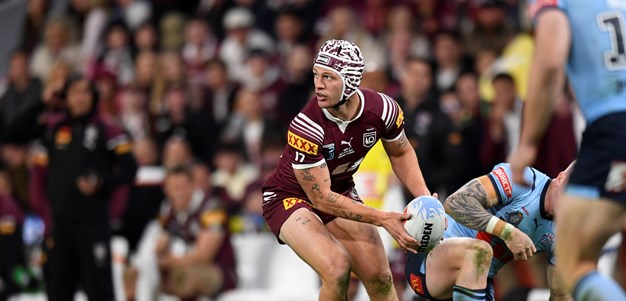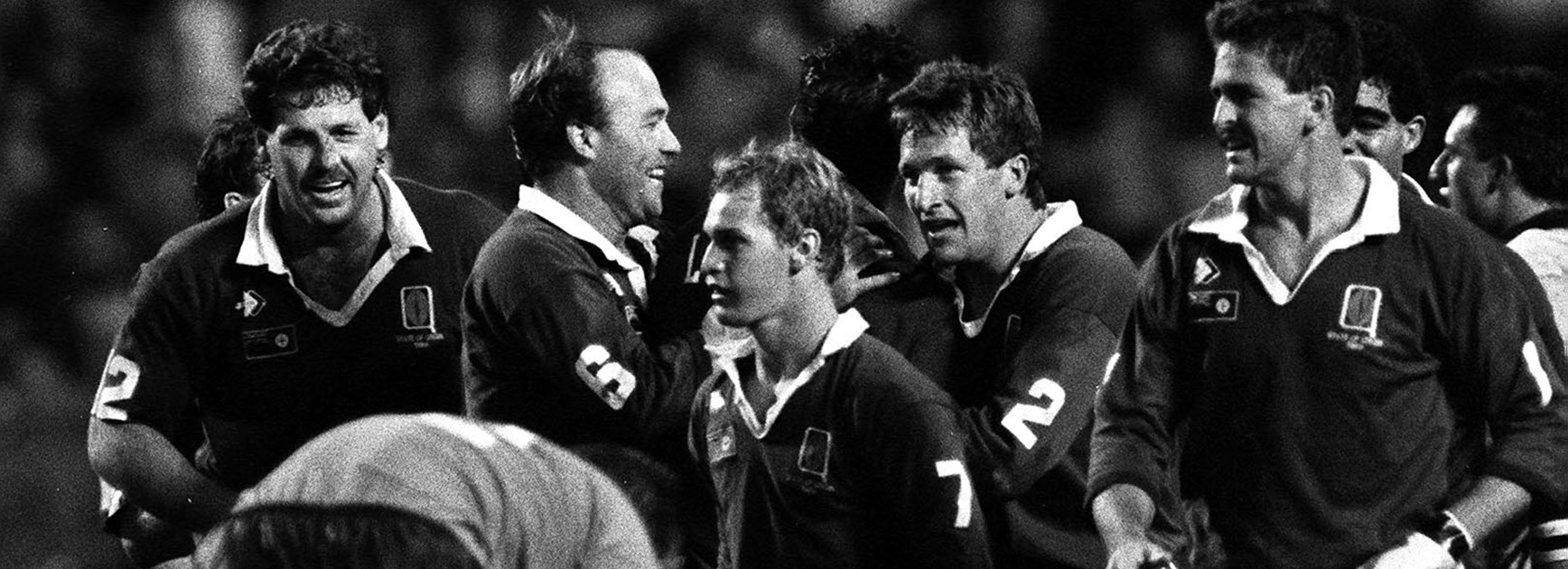
It's an Origin record that may never be broken.
Neither state has recorded consecutive clean sweeps since the 1988-89 Maroons, who used fate and an inordinate amount of rugby league talent to compose a winning streak of eight consecutive games – if you don't count the experiment in Long Beach, California of a fourth game in 1987.
Which, those north of the border, certainly don't.
"The American thing? I'd forgotten all about that. I don't even remember being there," says Wally Lewis, the lynchpin of a period of unprecedented Origin dominance.
"That was a gee-up," adds legendary Maroons fullback Gary Belcher.
"We were told it was an exhibition game and then all of a sudden the Blues want to count it! We didn't start playing until half-time."
Only the NSW team of 2000 – bolstered by their 56-16 demolition in Origin III – have recorded a more lopsided series win than the Maroons of 30 years ago in a three-game contest defined by supreme confidence, two legendary coaches and the most courageous victory in interstate history.
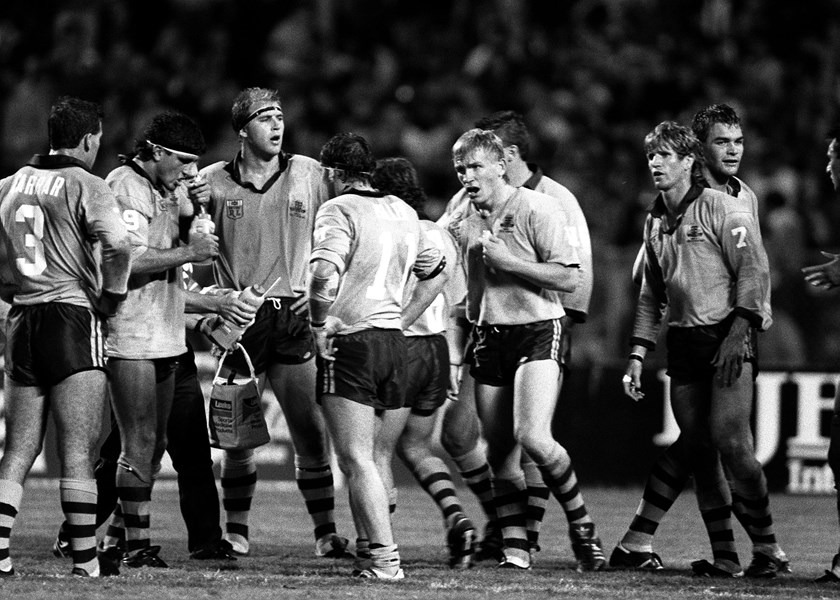
A momentous shift
The extraordinary element to Queensland's eight consecutive wins was they had lost seven of the previous eight games.
NSW wins in the opening two games of 1985 was followed by the Blues' first clean sweep in 1986 and then a last-gasp triumph at Lang Park to open the 1987 series.
It was a momentous shift in the interstate balance of power but it was to be short-lived, long-time Blues fullback Garry Jack believing it ended prematurely.
"It was a bloody great run and we dead-set should have won the second game in '87. [Barry] Gomersall, ‘The Grasshopper', he ripped us off blind," Jack says of Origin's most infamous whistle-blower.
"It should have all been over in the second game in Sydney in '87, we should have won that one.
"We had three different halves combinations in '88 and then '89 was a nightmare under Jack Gibson.
"He refused to pick Blocker [Steve Roach], he refused to pick Benny [Elias] and he didn't believe in camp. He thought camp was for boy scouts!
"We'd meet the day before at The Hilton in Sydney, have a night together and then play the next day. It was a very good Queensland side in 1989 but I don't believe it was our strongest NSW side. It really wasn't.
"It would have been a good battle with those '85 and '86 sides against them."
The Maroons fought back from 1-0 down to claim the 1987 series and after a clean sweep in 1988 entered the 1989 series riding a tidalwave of momentum.
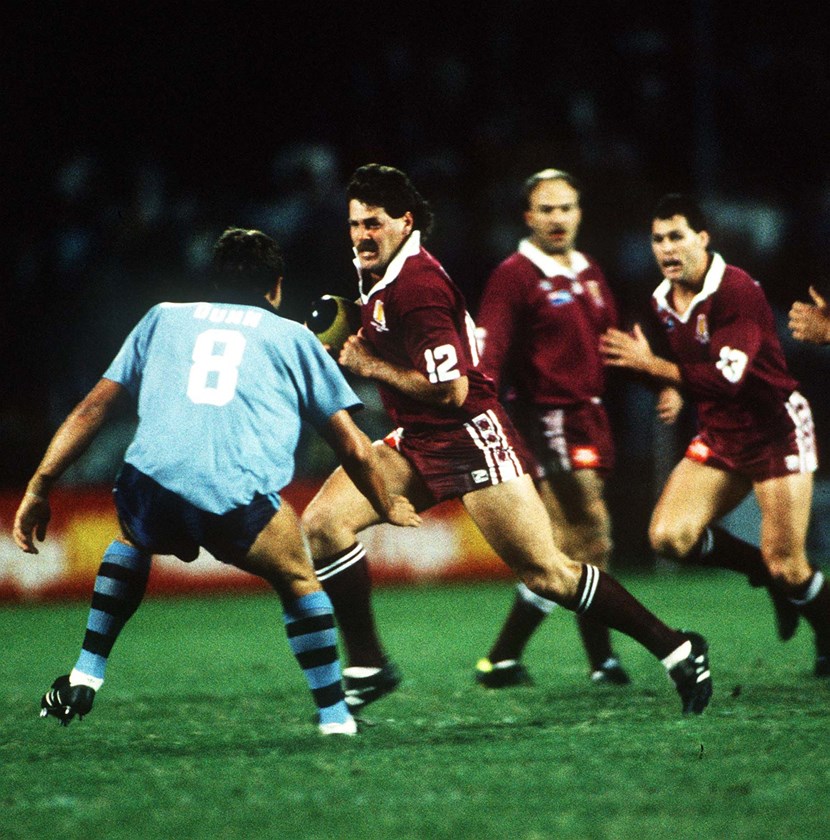
"You felt that expectation when you came in, of how good a team it was and that you needed to play at the best level you could in order to live up to that standard," remembers Michael Hagan, who made his debut in Origin I and would play a pivotal role as the series progressed.
"I was in awe of all of these blokes," admits hooker Kerrod Walters, another debutant for Queensland at the start of the 1989 series.
"I'd grown up watching them play and to play Origin with them was really quite surreal.
"My first game was at Lang Park, Arthur Beetson was the coach and Wally Lewis was the captain.
"To get the opportunity to play for Queensland was one thing but to play in such a great team was another thing as well.
"It didn't hit home to me that I was actually making my debut until 20 minutes before we were about to run out. Arthur Beetson came and presented me with my jersey and then I thought, ‘Shit, I'm about to play for Queensland'. And then you run out on to Lang Park and you feel 10-foot tall and bulletproof."
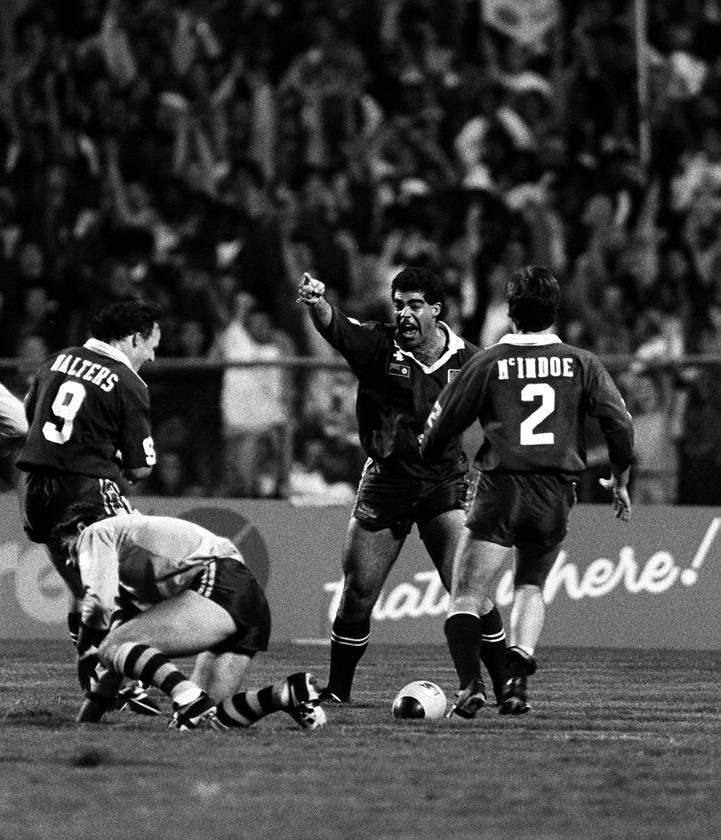
Perhaps sensing a need to plan for the future and a willingness to sacrifice a series for the greater good, the Blues blooded eight players in Game One and 15 throughout the three games.
Captained by Sharks skipper Gavin Miller who was returning after a six-year Origin hiatus, players such as Laurie Daley, Bradley Clyde, Paul Sironen, Glenn Lazarus and Greg Alexander were thrown to the Lang Park lions.
They suffered a crushing 36-6 defeat, to this day the second-biggest defeat inflicted by Queensland.
"For me it was certainly out of the blue. It was the last thing I expected," says John Cartwright, another of the 1989 debutants.
"I initially didn't make the City-Country game. I got called into it late when a lot of guys pulled out a day or two before the game.
"I played half a game for City Firsts and went OK, played pretty well for Penrith on the Sunday and then on Sunday night the Penrith manager told me I'd been picked for Origin.
"It was sheer surprise and then excitement and then we got hit between the eyes when we ran out and actually had to play the game."
Jack adds: "They were just kids. I think Clydey was 20 and Laurie might have been 19. I remember Laurie at half-time saying, ‘I can't believe how quick it is. I can't breathe! I can't believe how quick it is!' He was running around like a headless chook."
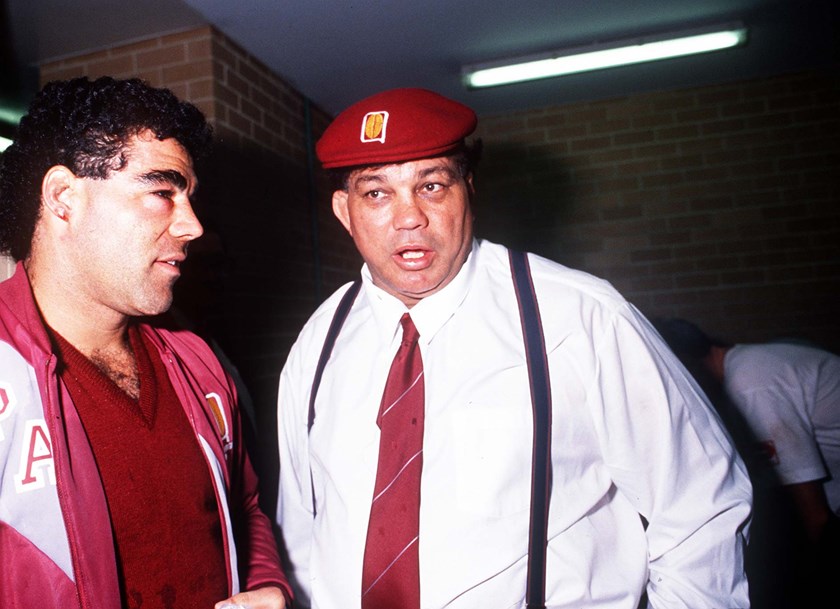
Cartwright remembers the match as "an absolute blur".
"I thought I'd played in fast games before but I'd never experienced anything like the speed of that whole game. It was like being stuck in a cyclone."
For Lewis, the 1989 team represented the culmination of bonds built up on the footy fields throughout Brisbane for more than a decade.
"We were the best of friends. We were the closest mates that I've experienced in a representative football team," says the Maroons leader.
"We'd get together the first couple of days and have a few beers and tell stories that you'd heard plenty of times before but you'd be laughing longer and louder than you ever had.
"When Ron McAuliffe was asked who was responsible for Queensland's success he said it was the Lord.
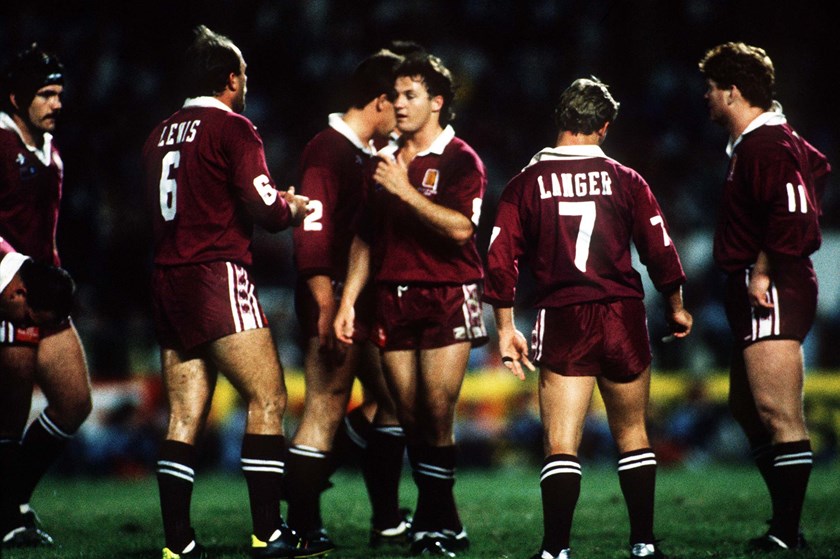
"Colin Scott, Kerry Boustead, Gene Miles, Mal Meninga, Chris Close, Wally Lewis, Mark Murray, Paul Vautin, Wally Fullerton-Smith, every one of those blokes was born within 18 months of each other.
"The team changed a little bit later but we were still a group of blokes that had played a fair bit of football against or alongside each other and, more importantly, were the best of friends.
"That made each and every game an experience for us. We had this will to win, determination to succeed and become even better than what we were last time."
Jack and Artie
A decade later you'd see them travelling regional areas spotting talent at schoolboy carnivals but in 1989 Arthur Beetson and Jack Gibson defined Origin's long-standing mantra of "mate against mate".
Two of rugby league's most iconic figures who had worked together as player and coach first at the Roosters and then Parramatta, they were called in to replace Wayne Bennett and John Peard as their state's respective coaches.
Coaching NSW in 1989-90 would be Gibson's final coaching appointment, his young players in awe of the status he carried within the game.
"I knew everything that he'd done," Cartwright says.
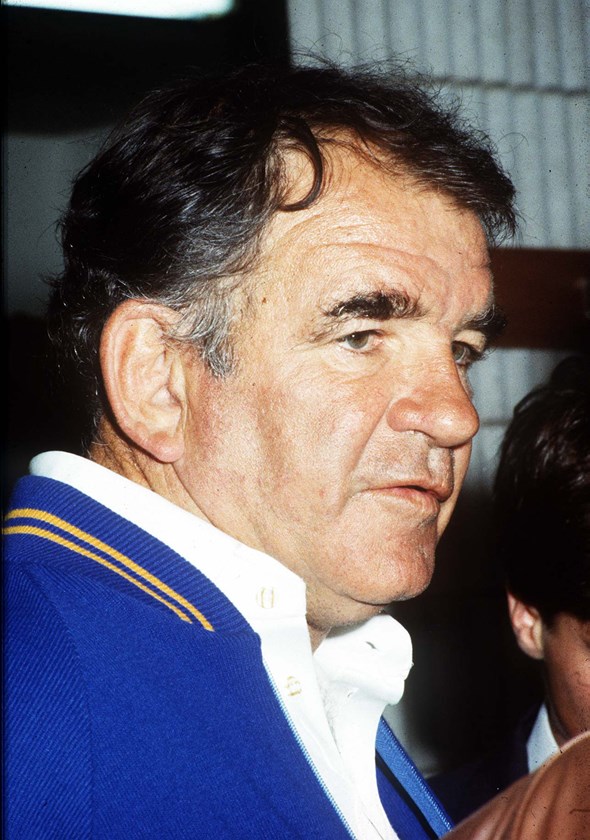
"He was held in such esteem that he didn't really have to say too much at all. He could have told me anything and I would have believed it. It was like meeting a mythical person.
"He was like a football god."
Queensland's first captain in 1980, Beetson coached the Maroons to a win in the one-off 1981 clash and series wins in 1982, '83 and '84, his return a masterstroke in overturning the recent Blues success.
"Artie was a really intelligent guy. I didn't realise how smart he was as a coach and as a person until I played under him," says Belcher.
"And you just wanted to play for him. Not just because of what he had done but he was the kind of guy that I felt I really wanted to play for and show that I was as passionate about Queensland as he was."
That's not to say "the King" couldn't get his way, particularly early in the week.
"We used to get out of the team bus and Beetso would say, 'No mucking around today, warm up and we'll get straight into some moves,'" says Lewis.
Sign up for a free NRL Account to access this video and other exclusive content.
Sign UpAlready have an NRL Account?
Not sure? Learn more about an NRL Account .
"I'd run the blokes around to the far corner and we'd stop and have a game of touch.
"As he made his way over all you'd hear was, 'Turn it up you blokes, turn it up. Youse had a drink last night, start doing some exercise!' And I'd pull him aside and say, 'Beetso, don't. Bryan Niebling has been talking about nothing other than what it would have been like to run off the great Arthur Beetson.'
"We'd talk him into a game of touch which would start out as the best of three. We'd let Beetso throw the match-winning pass and he'd say, 'Best of five!' And then it would end up something like 33-31.
"But when we needed to be, it was super serious."
The bravest win of all
As the 12 remaining Queensland players trudged from the field following their 16-12 win in Origin II at the Sydney Football Stadium, Lewis stopped his battered and bruised team and brought them back out onto the field.
Serious injuries to Allan Langer, Mal Meninga and Paul Vautin in the first half were followed by further injuries to Michael Hancock and Bob Lindner in the second, Lindner limping gamely on the wing with a broken leg until leaving the field seven minutes from full-time, the only time in Origin history a team has been unable to field 13 fit players to finish a game.
It's been described as the most courageous win in Origin history and earned the Queenslanders the respect of the 40,000 mostly Blues fans in attendance despite watching their team suffer another series loss.
I learnt more out of that 1989 series than at any other stage of my career.
John Cartwright
"We'd shaken hands and we were walking off and I pulled the guys back," Lewis remembers.
"They wanted to get in the sheds but I said, 'Stand here and accept this because I can guarantee you this will be the only time that a Queensland team ever gets a standing ovation from a Sydney crowd'."
Belcher, who played 16 times for Queensland from 1986-1993, was gobsmacked by the run of injuries
"It was just desperate. We had blokes going down and struggling to keep enough fit players on the park," he says.
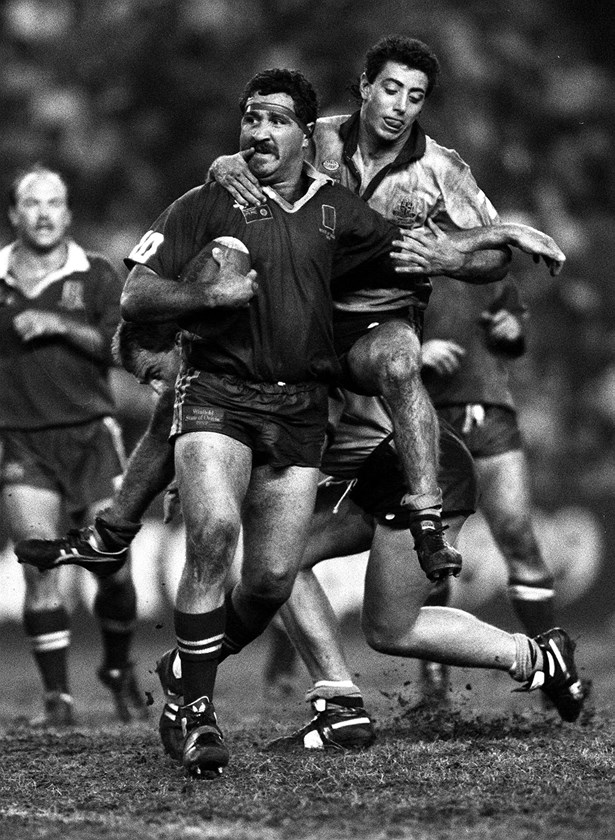
Coming on after 15 minutes due to the broken ankle suffered by Langer, Michael Hagan provided the final pass for both tries to Kerrod Walters and Lewis for the Maroons to go up 16-6 midway through the second half.
Lewis's try, the seventh and final of his incomparable Origin career, remains one of the most iconic Origin moments, and a source of pain for Jack for the past 30 years.
The Balmain great had broken his arm three months before the start of the Origin series and had a six-inch plate and 10 screws inserted, the lingering psychological damage of that injury coming back to haunt him late in the game.
"I was always a low tackler – I never went high – but I just didn't have the confidence to go low," says Jack, who was pushed away by Lewis as the Queensland captain crashed over out wide.
"That's why I went to grab him and as soon as I did he just gave me a big palm, ‘Get out of my way'. I did a similar tackle on him in '86 and cut him down just short of the try line by going low but I didn't have the confidence to go low.
"That was a critical try … and they show it every year."
I walked into the sheds and it was the only time I ever saw Arthur Beetson with tears in his eyes.
Wally Lewis
With bodies strewn across the cramped SFS dressing room, Beetson tried to address his players after full-time but struggled to find the words.
"I walked into the sheds and it was the only time I ever saw Arthur Beetson with tears in his eyes," says Lewis.
"He was just shaking his head. He tried to start talking and lost it. 'I've seen some great efforts in my time but nothing – nothing – will ever get close to that.' Then he lost it again.
"There were virtually zero celebrations at the end of it. They were rooted. You'd nod your head at your mate but that was about it. They couldn't give anything more.
"That was unheard of. It really was."
Sign up for a free NRL Account to access this video and other exclusive content.
Sign UpAlready have an NRL Account?
Not sure? Learn more about an NRL Account .
End of an era
For eight consecutive games Queensland's stranglehold showed no signs of relenting, yet the next year the young NSW players who had been prematurely injected into the Origin arena turned the tables.
The recall of Elias as captain and Roach into the front row gave the stability they desperately needed to kick-start their own era of dominance.
"Laurie was coming in as a kid, Bradley Clyde, they had a couple of younger guys that you knew were going to be a part of their team for a long time after that," says Hagan, whose two appearances in 1990 would be his last.
"Laurie might only have been 19 or 20 at the time, Bradley Clyde was the same, Brandy [Greg] Alexander was only young. They had some real talent that was going to be there for a long time."
Cartwright was overlooked in 1990 but returned in 1991 and 1992, desperate to generate positive Origin memories before his career came to a close.
"I learnt more out of that 1989 series than at any other stage of my career," Cartwright reveals.
"I remember being embarrassed that we lost 3-0, especially losing the way we did. We were shell-shocked in that first game and embarrassed at the end of it all but I took it the right way and learnt a hell of a lot from it.
"I do remember thinking that I'd hate to have to finish Origin on that note. I certainly wanted an Origin series win by the end of my career."
One of the 1980 originals, Lewis shocked everyone when he retired from Origin football after Queensland's 1991 series win but his influence two years earlier will always be a prominent chapter in the King Wally legend.
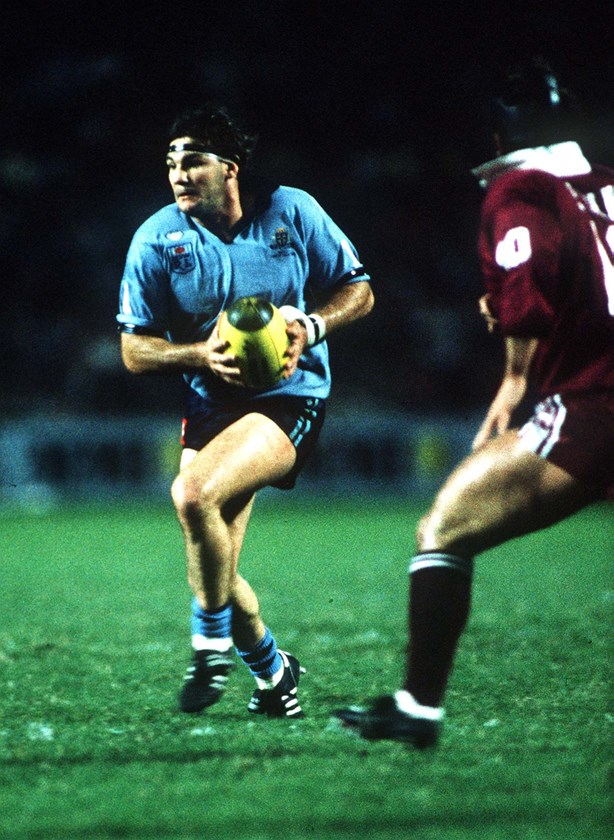
"He could do anything," says Jack, whose Blues career ended in Origin III of 1989, his seventh loss in a row.
"He was a very clever thinker, he tried to control the referees, he could control a game and he could motivate his players.
"He was a great leader, he really was."
Walters believes there will never be another King in the Origin arena.
"Eight man-of-the-match performances, no one's ever going to eclipse that," he says.
"And in those games when he wasn't man of the match he was often the difference between the two teams.
"Wally Lewis is still the greatest Origin player of all time because every game, he had a hand in deciding the outcome."
Sign up for a free NRL Account to access this video and other exclusive content.
Sign UpAlready have an NRL Account?
Not sure? Learn more about an NRL Account .
Be part of the action for Origin I at Suncorp Stadium Secure your seats here
